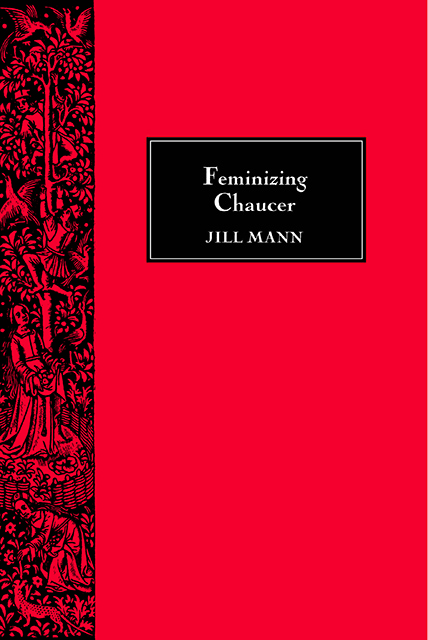Book contents
- Frontmatter
- Contents
- Dedication
- Preface to the 2002 Edition
- Preface
- Abbreviations
- Introduction
- 1 Women and Betrayal
- 2 Antifeminism
- 3 The Surrender of Maistrye
- 4 Suffering Woman, Suffering God
- 5 The Feminized Hero
- Conclusion
- Excursus: Wife-Swapping in Medieval Literature
- Chaucer Studies
- Bibliography
- Index
Introduction
Published online by Cambridge University Press: 17 March 2023
- Frontmatter
- Contents
- Dedication
- Preface to the 2002 Edition
- Preface
- Abbreviations
- Introduction
- 1 Women and Betrayal
- 2 Antifeminism
- 3 The Surrender of Maistrye
- 4 Suffering Woman, Suffering God
- 5 The Feminized Hero
- Conclusion
- Excursus: Wife-Swapping in Medieval Literature
- Chaucer Studies
- Bibliography
- Index
Summary
‘For al so siker as In principio,
Mulier est hominis confusio –
Madame, the sentence of this Latyn is,
“Womman is mannes joye and al his blis.” ’
(Nun's Priest's Tale 3163–6)The polarized nature of medieval attitudes to women is notorious. Eve is set against Mary, the sensual deceiver against maternal purity, rebelliousness against meekness (Blamires, 1992). Yet this ambivalence is not a specifically medieval phenomenon; its roots can be traced back at least to Roman antiquity, where it is already visible in the two authors who contributed largely to the formation of these stereotyped images, and whose influence on Chaucer's works is readily apparent: Ovid, whose amorous poetry represents women as cunning strategists in the battle of the sexes, yet who is also ready in the Heroides to see them as helpless victims of male cruelty; and Jerome, whose treatise Against Jovinian is a major weapon in the arsenal of antifeminist texts deployed by the Wife of Bath's fifth husband, yet is also cited by the God of Love in the Legend of Good Women as a source for stories of women who were ‘goode and trewe’ (G 270–304). In the Middle Ages, the oppositions that were the by-product of Ovid's playfulness and Jerome's polemic hardened into opposing positions in a self-conscious debate about the nature of women of which medieval writers seemed never to tire: were they good or bad, victims or predators, patient sufferers or aggressive shrews? Were their true representatives Penelope, Lucretia and Griselda, or rather Eve, Delilah and Clytemnestra? Often the same author could take up both positions in turn. The Latin writer Marbod of Rennes (c.1035–1123) followed his poetic picture of ‘the harlot’, an attack on women as the root of all evil, with an idealizing picture of ‘the matron’, eulogizing female virtues. In the late twelfth (or perhaps early thirteenth) century, Andreas Capellanus, ‘chaplain at the royal court’ and author of the well-known treatise On Love, imitated the volte-face between Ovid's Ars Amatoria and his Remedia Amoris: the first two books of Andreas's work, which instruct its addressee Walter in the art of wooing, present woman as the quasi-divine goal and fulfilment of male desire, while the third urges him to reject women's love altogether, bolstering its case with the antifeminist clichés which represent the whole sex as predatory monsters.
- Type
- Chapter
- Information
- Feminizing Chaucer , pp. 1 - 4Publisher: Boydell & BrewerPrint publication year: 2002



